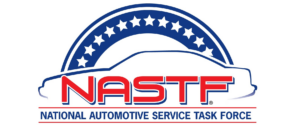Proud Member of NASTF


In the past few years, the auto industry has seen major changes in designs and special features, and keeping these cars maintained and on the road takes highly skilled technicians and mechanics.
“Today’s mechanics are not the mechanics of five years ago. The training for auto technicians today is incredible. The industry is moving extremely fast with technology, and so is the ongoing and advanced training that our mechanics are engaged in,” said Marc Cannon, senior vice president, AutoNation, a retailer of new cars, trucks and SUVs, with 18 store locations in Houston.

According to Cannon, five years ago, Bluetooth technology was just being introduced and is now in most new cars.
Navigation equipment, voice activation, hybrids and electric cars are all new technologies, so mechanics are being continually trained. Diesel vehicles also have changed – they are cleaner and more efficient.
“The chairman and CEO of AutoNation started his career as a mechanic, so he is heavily vested and interested in all of our service departments (having) the most advanced training,” Cannon said.
The advanced training Cannon noted, is offered by the dealerships, and often manufacturers send representatives for training. Other methods of training include videos, web-based classes, and live training at dealerships. If there are special courses being offered at a local college, AutoNation sends its mechanics.
“We are making large investments in our service departments to ensure our mechanics are all well trained,” Cannon said.
Universal Technical Institute, a nationwide provider of technical education training for entry-level automotive, diesel, collision repair, motorcycle and marine technicians, is also constantly updating its programs for the new technology.
“We have two programs, one for core courses, and specializations. For example, we offer specializations for nine or 10 manufacturers, such as Ford, Mercedes, Nissan, Cummins Motors, etc. These programs are supported by the manufacturers,” said Ed Fletcher, director, Employment Services, Universal Technical Institute Inc.
For example, when students complete the Ford program, they have 60 percent of the certification needed to be a Ford Master Technician.
The school continues to keep up to date through relationships with the manufacturers, which provide the latest model vehicles for the students to train on.
“We graduate very competent technicians/mechanics, with a strong background of fundamentals, and specific manufacturer training. Most of our students work part time in a shop or dealership while they are still in school. After graduating, they move to full time,” Fletcher said.
Right now, Fletcher said that vehicle technicians/mechanics are in high demand, more so than ever before, and he has more job openings than he has students. There are approximately 1,500 students in the school, with programs being one to two years, depending on a student’s chosen path.
“The oil and gas industry hires many of our students. All of the new fracking equipment, pumps, generators and others, all work off engines, which have to be maintained, with preventive maintenance and repair, which our students can do. This industry is an open opportunity for our students,” Fletcher said.
The pay for auto mechanics differs from each facility, shop or state. However, nationwide, auto service technicians/mechanics earned a mean annual income of $41,370 in 2009, according to the Bureau of Labor Statistics. Due to the demand, these numbers have gone up.
“In Houston, there are usually different pay areas, such as commission, hourly and salaried. Those who work on commission and are good, and work fast can make six figures,” Fletcher said.
Further details
For information about UTI Houston, visit www.uti.edu, and for AutoNation, www.autonation.com.




